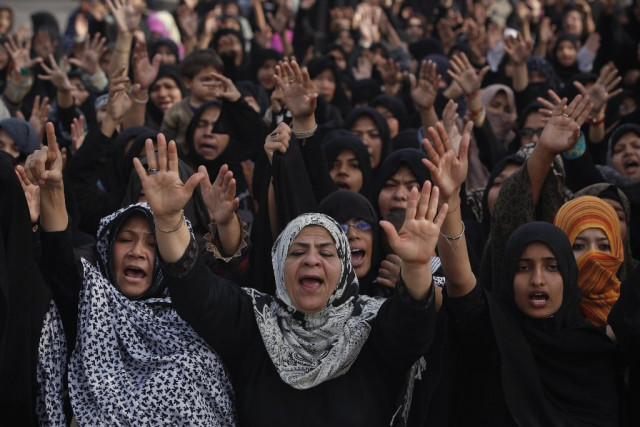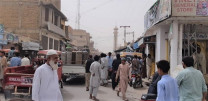After the carnage
Beyond the immediate, the focus has to be on ending the killing of Shias.

Shia Muslim women stage a sit-in protest against last Thursday's twin bomb attack in Quetta, in Karachi January 14. PHOTO: REUTERS
The action, which came as Prime Minister Raja Pervaiz Ashraf visited mourners in the Balochistan capital, shows protest can have power. The countrywide vigils were effective — but most moving of all was the quiet protest by the Hazaras along Alamdar Road in Quetta, where men, women, the elderly and infants sat in sub-zero temperatures, coffins laid before them, refusing to bury their dead till some notice was taken of their plight. The rows of coffins, so many of them containing bodies of young men whose futures were snatched away, meant Quetta resembled Beirut or Palestine in their worst days. Certainly, the city is a war zone.
Given this, the government action was inevitable. Of the PPP’s coalition partners, the PML-Q and the ANP backed the move. The JUI-F and the BNP-A did not, calling it unconstitutional. The debate will rage. There are no easy answers. But we have to remember the change in rule will not bring miracles. Nawab Zulfiqar Ali Magsi has not been an especially effective governor. Nor was he, in the past, a chief minister with significant achievements notched up against his name. It will have to be seen how he tackles matters now. This is all the more so given that these matters will not be easy to handle given the kind of disarray Quetta has slipped into over the past few years. What strategies Magsi can adopt to tackle this situation will certainly be worth watching. We must hope things improve; but we must not also forget that the imposition of governor’s rule is not in itself likely to bring miracles. While the demonstration of some kind of concern has for now satisfied the distraught Hazara mourners, we must also keep in mind that in the longer run, more powers for paramilitary forces they distrust is not likely to go down well with the people of Balochistan. We have seen the problems arising from this before.

But beyond the immediate, the focus has to be on ending the killing of Shias. It has gone on far too long; it is tragic no one spoke out loudly enough early. The massacre in Quetta finally raised the conscience of people, even if their protests came late and did not always bring out numbers as large as we would have hoped. But the burials in Quetta, the dismissal of the provincial government and the taking over of charge by Magsi does not mean the protests should end. Indeed they must continue. To solve the sectarian issue on a more lasting basis, it is groups like the Lashkar-e-Jhangvi and the Sipah-e-Sahaba Pakistan — renamed the Ahle Sunnat Wal Jamaat — which have to be gone after; they have to be eradicated and more people, of all sects and beliefs, need to raise their voices for this. Until these forces are eliminated, more killings will take place, as bodies fall along roadsides and hatred pours out onto the streets. The question that has to be asked is if the military and the forces it commands are genuinely willing to set about this task. They have not done so in the past. This is the key reason for the issues we face. Militant groups have strengthened their base due to this attitude. The idea that they are ‘strategic assets’ lingers on. This thinking has to change — but will it? Major steps are required to change the mindset of those who deal with such matters and genuinely create a situation where people are not mowed down or targeted by suicide bombers simply because of their sect or ethnicity. It is only when we achieve this that any kind of real change will come.
Published in The Express Tribune, January 15th, 2013.


















COMMENTS
Comments are moderated and generally will be posted if they are on-topic and not abusive.
For more information, please see our Comments FAQ